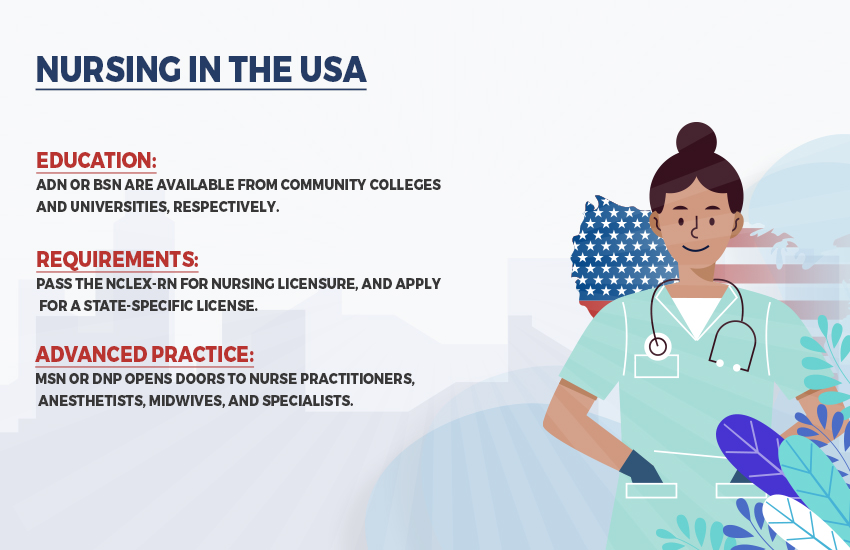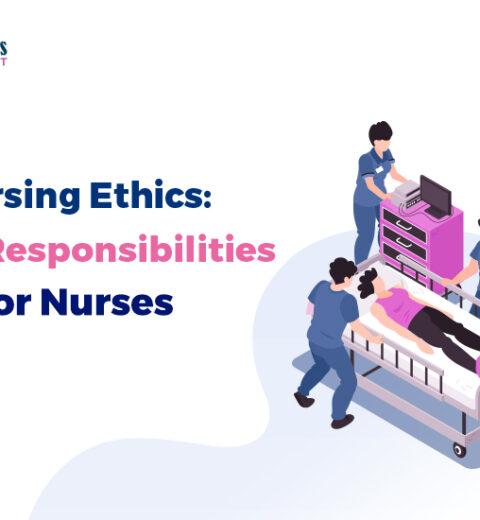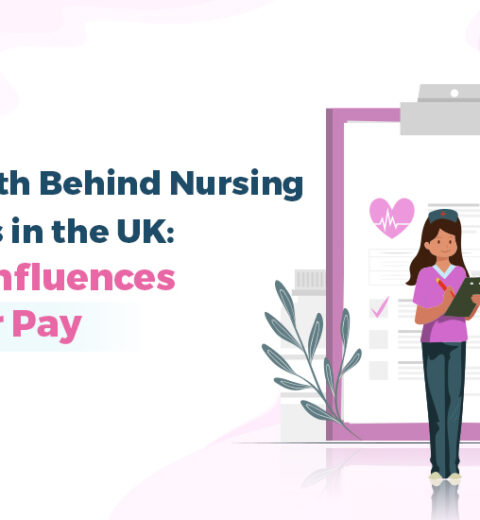Introduction
Nursing offers numerous options, both professionally and personally, making it an attractive career choice for many. As nurses remain in high demand worldwide, it’s no surprise that several contemplate working abroad to explore new opportunities. Among the sought-after destinations, the United States and the United Kingdom stand out due to their excellent healthcare systems and diverse nursing prospects. As aspiring nurses consider their options, the question arises: Is there an easy process to go to the US or UK as a nurse? Let us delve into the comparison to find out.
Understanding the Nursing Profession

Nursing is central to healthcare. Nurses provide patient care in hospitals, nursing homes, and other settings, promoting health, avoiding disease, and assisting patients in dealing with illness. They are hands-on healthcare providers who give concentrated, highly personalised care. They play an important function in the medical field.
Becoming a Nurse: A Brief Overview
Embarking on a nursing career requires specific academic qualifications, followed by professional licensing. It’s a rigorous process, but one that yields great rewards in terms of job satisfaction and career prospects. But how does this process vary between the US and the UK?
Exploring the Nursing Pathway in the US and the UK
The nursing pathway in the United States and the United Kingdom have certain similarities but also differ significantly. While both countries provide rewarding prospects for ambitious nurses, the school requirements, license processes, and practice contexts differ. Let’s have a look at the nursing career paths in each country:

Education
Aspiring nurses can obtain either an ADN or a BSN. Community colleges offer the ADN, whereas universities and colleges offer the BSN, which is a four-year degree.
Requirements and Steps
To get their nursing license, graduates must pass the National Council Licensure Examination for Registered Nurses (NCLEX-RN) after completing their nursing program. Each state has its own licensing board, and nurses must apply for a license in the state where they intend to work.
Advanced Practice
There are several options for advanced practice nursing employment in the United States. Nurse practitioners, nurse anesthetists, nurse midwives, and clinical nurse specialists with a Master of Science in Nursing (MSN) or a Doctor of Nursing Practice (DNP) can pursue graduate-level studies.
Advantages and Challenges
The US boasts a dynamic healthcare environment, promising opportunities, and competitive salaries. However, the path is not without hurdles: navigating the immigration process and meeting stringent licensing requirements can be complex.
Exploring the Nursing Pathway in the UK

Education
Nursing education in the United Kingdom is primarily centered on a Bachelor of Nursing (BN) degree as the traditional approach. Depending on the course and institution, students can additionally pursue a Nursing Diploma or an Advanced Diploma in Nursing.
Requirements and Steps
To work in the UK, foreign-trained nurses typically need to complete the Overseas Nursing Programme (ONP) and pass the Nursing and Midwifery Council (NMC) test. They also must obtain an appropriate work visa.
Advanced Practice
In the UK, nurses have advanced practice opportunities. The process may differ from the US, but nurses can specialize in clinical areas through postgraduate studies and training, advancing their careers.
Advantages and Challenges
The UK offers diverse work settings and a patient-centered care model. The ONP is also shorter than a traditional nursing degree. However, potential challenges include language proficiency requirements and adjusting to a new healthcare system.
Comparing the US and UK Nursing Pathways

Education and certification
While both countries require specialized nursing qualifications, the ONP in the UK is a quicker path than the typical BSN degree in the US. The NCLEX-RN (US) and NMC (UK) tests, on the other hand, are both tough and need much preparation.
Career Opportunities
Both countries offer vast career opportunities and competitive compensation. However, the US market is larger and may offer more diversity in job roles.
Living Standards
Living standards in both countries are high, but they have distinct cultural differences. Personal preferences will play a significant role in this decision.
Note: Please note that this table provides a general comparison and may not cover every specific detail. Nursing pathways may evolve over time, so it’s essential to consult the latest information from authoritative sources when considering a nursing career in either country.
What is the easiest country to travel as a nurse?
The ease of travelling as a nurse might vary based on criteria such as nursing qualifications, language competency, visa regulations, and the destination country’s healthcare system. While there is no definite answer, some nations are recognised as relatively easier for nurses to travel and work in due to nursing shortages and streamlined procedures.
Countries such as the United States, the United Kingdom, Canada, Australia, and New Zealand frequently provide pathways and particular visa alternatives for overseas nurses to satisfy their healthcare demands. It is critical for nurses to investigate the standards and laws for nursing practice in their selected nation, and consulting with immigration professionals or nursing regulatory authorities can help make the process go more smoothly.
Is it easy to move from the UK to the USA as a nurse?
Moving from the UK to the USA as a nurse is a feasible but multifaceted process. The ease of transition hinges on factors such as the recognition of your nursing qualifications in the US, obtaining a nursing license in the state of your choice, securing the appropriate work visa (such as H-1B or TN), the demand for nurses in your preferred region, your nursing experience, and proficient English language skills.
While the journey involves careful steps and adherence to legal and licensing requirements, seeking advice from immigration specialists and nursing regulatory bodies can provide valuable guidance to help streamline the process effectively.
Conclusion
The decision of whether to pursue a nursing career in the US or the UK depends on various factors, such as personal preferences, career aspirations, and individual circumstances. While the UK’s nursing pathway may be shorter, the US offers a larger job market. Both countries boast high standards of living and promising career prospects for nurses. Thorough research and preparation are essential before embarking on either path.
For those considering nursing opportunities in the UK, it’s worth noting that the UK presents excellent prospects and exciting challenges for nursing professionals. At JP Medicals, we are dedicated to helping aspiring nurses make their dreams a reality. Our recruitment services in the UK can provide valuable guidance and support in finding the right nursing position that aligns with their skills and aspirations. Explore the numerous NHS and private nursing opportunities in the UK with JP Medicals and take your nursing career to new heights.
FAQs
In the US and the UK, what are the conditions for nursing visas?
Foreign-trained nurses must have work visas in both nations. Research should be done carefully because specifics differ.
Which country has a higher demand for nurses?
Both the United States and the United Kingdom have a high demand for nurses. However, due to its greater population and substantial healthcare infrastructure, the United States is likely to have more job openings for nurses than the United Kingdom. Both countries recognise the critical role nurses play in their healthcare systems, making nursing a promising and rewarding career path in either country.
What is the average salary for nurses in the US and UK?
Salaries vary by specialization and experience. On average, US nurses may earn a higher salary, but cost of living should also be considered.
Do I need to know English to work as a nurse in these countries?
Yes, both countries require proof of English language proficiency.
What other factors should I consider when choosing between the US and UK?
Consider factors such as cultural fit, lifestyle, work-life balance, and opportunities for professional growth.






